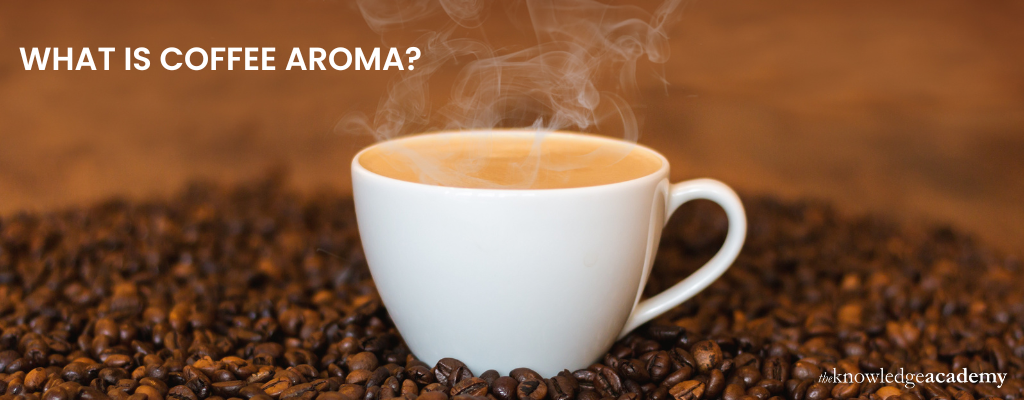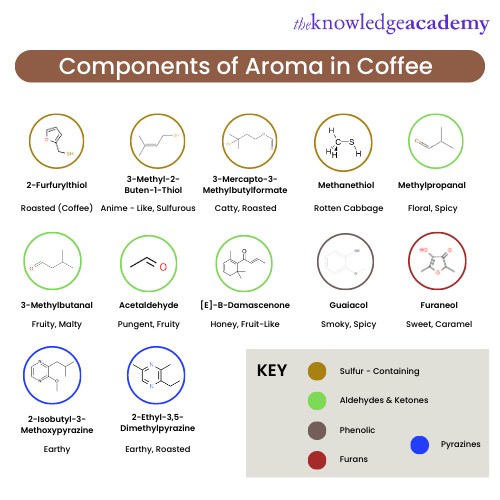We may not have the course you’re looking for. If you enquire or give us a call on +358 942454206 and speak to our training experts, we may still be able to help with your training requirements.
Training Outcomes Within Your Budget!
We ensure quality, budget-alignment, and timely delivery by our expert instructors.

It is commonly stated that Coffee’s Aroma plays a huge part in its taste. Many Coffee lovers say that different Coffees have fruitier or caramel notes. You’ll often hear people making statements like “Coffee’s smell helps them calm down” or “feel less anxious” denoting a positive effect on a person's mood.
According to a scientific report, patients who underwent painful dental procedures showed significantly lower stress hormone levels - 25% less Cortisol while inhaling the Aroma of the Coffee compared to patients who didn't inhale the Aroma.
Does this make you wonder what exactly Aroma is? And how does it play a part in your experience with a cup of Coffee? A pleasant scent that you wish to smell and appreciate is known as Aroma. This blog will help you learn more about Coffee Aroma. Read more!
Table of Contents
1) Coffee Aroma description
2) Where does "Aroma in Coffee" come from?
3) How Aroma changes our experience?
4) How to get the best Aroma of Coffee?
5) Conclusion
Learn and excel at skills such as Brewing, Phone Repair, etc. Register for our Industry Training course today!
Coffee Aroma Description
Aroma, borrowed from the Latin arōma, describes a spicy or fragrant smell. The Aroma of the Coffee essentially refers to its smell. It comprises many elements that enhance your Coffee-drinking experience. Any flavour that cannot be categorised as salty, sweet, sour, bitter, or umami is considered an Aromatic flavour.
The fragrance is considered a prime factor while determining the quality of Coffee, as it denotes many characteristics of the beverage. It represents Coffee's sweetness, bitterness, acidity, and aftertaste. The fragrance of Coffee can be diverse depending on the type of Coffee beans used and the roast. The fragrance can range from fruity to caramelised. It can also be burnt or woody.
Where does the "Aroma in Coffee" come from?

Aroma is derived from various components like proteins, carbs, and acids, which turn volatile during the 'Maillard' reaction while roasting. Maillard reaction occurs because sugars and proteins present in the food react with each other in the presence of heat. This gives food its significant brown colour and distinct taste. Due to the roast playing such a huge factor in Fragrant release, the roast level of Coffee strongly influences the scent we sense from it.
Various chemical compounds are responsible for varying flavour notes, giving Coffee different sensory characteristics. For instance, compound 2-methyl pyridine is the source of most primary roasted notes people perceive from Coffee. Similarly, notes like nuttiness come from Pyrazine compounds, such as 2 and 3-Dimethylpyrazine, or certain ones like 2-Ethyl-3-methyl pyrazine can give a burnt smell to it.
Other compounds are also formed during the acidic breakdown. For example, Ketones are primarily responsible for giving a food or beverage its fruitier notes or buttery Flavors, while compounds like phenols can give Coffee a smoky smell.
How Aroma changes our experience?
Aromas are not limited to just your favourite cup of Coffee. Our mind processes them through our tastebuds and our nose. This process is known as “Retronasal Olfaction”. During this process, the flavour is first perceived by our taste buds, followed by the olfactory sense (sense of smell). When we drink a cup of Coffee, we taste its Flavors, and later it is perceived by our smell receptors, completing the experience for us.
As Aroma exists everywhere, be it in a restaurant or a café, it can alter a person's mood. For instance, a pleasing fragrance found in an environment you are familiar with can trigger memories associated with that environment. If you ever go hiking through mountains or forests, the smell of soil and seasonally decomposing leaves have an earthy feel, evoking positive emotion within a person.
How to get the best Aroma of Coffee?
Since the Aroma of Coffee depends upon releasing pleasant-smelling components through the air in a volatile state, fresh Coffee is considered the best. Since volatile fragrant components in Coffee deteriorate with time, fresh Coffee tastes better than older ones, which have a stale cardboard-like smell.
Alongside the freshness of Coffee, the roast plays a significant factor in the Aroma. In their raw states, Coffee beans have no fragrance or smell. This is because Green Coffee beans don't have any Aromatic components released until it is roasted. The smell of brew depends on fragrant components turning volatile and getting released freely due to heat. The fragrance is released only during and after the roasting process.
The Coffee gets its sweet and nutty scent thanks to the roasting process. As the Coffee is roasted further, leading to a darker roast, the fragrance gets stronger due to more flavour compounds being released in the air. But roasting the Coffee for too long can lead to some Coffee losing its unique characteristics.
The smell of Coffee doesn't come from green Coffee beans by themselves. However, the components that lead to the Aroma are dependent on the type of bean being used. It can have a variety of origins, selection processes, climate, and maturity levels, leading to the varying chemical composition of green Coffee beans.
Conclusion
The Coffee Aroma plays a huge factor in how and how much we enjoy our Coffee, as our sense of taste and smell go hand in hand. It may be challenging to take your time and experience the subtle sensation. Still, eventually, as you get better at it with time and patience, you'll witness it changing your experience for good and the Coffee's taste for the better.
Want to learn more about Coffee beans and roast varieties? Join our Basic Barista Course now!
Frequently Asked Questions
Upcoming Business Skills Resources Batches & Dates
Date
 Basic Barista Course
Basic Barista Course
Fri 21st Feb 2025
Fri 25th Apr 2025
Fri 20th Jun 2025
Fri 29th Aug 2025
Fri 31st Oct 2025
Fri 19th Dec 2025







 Top Rated Course
Top Rated Course



 If you wish to make any changes to your course, please
If you wish to make any changes to your course, please


